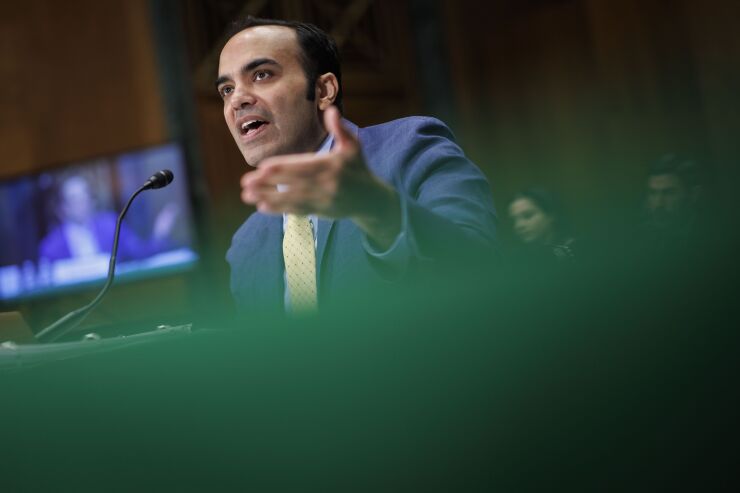
Rohit Chopra, the director of the Consumer Financial Protection Bureau, was asked at a consumer law conference last week whether his tenure at the agency could be characterized as finding creative ways to use existing laws to enforce regulations.
During a "fireside chat," Chopra was asked by Christopher Peterson, the John J. Flynn endowed professor of law at the University of Utah's S.J. Quinney College of Law, about whether there is a so-called "Chopra doctrine," and if it is rooted in finding new ways to enforce the CFPB's existing legal authority.
"I would propose that if there is a Chopra doctrine, it's finding creative uses of existing statutory authority to do bold new product projects," Peterson said. "You seem to look for untapped statutory authorities that have been residing in the U.S. Code, waiting for creative new applications. Is that fair?"
But Chopra categorically rejected that view.
"No," he said, to laughter from Peterson and the audience of lawyers and law students.
Instead Chopra described his three years at the CFPB as merely reading the actual language of the law and trying to be faithful to the intentions of Congress.
"It's so inherently uncreative to read the statute and use it. There's nothing creative about reading statutes," Chopra said Friday at the Salt Lake City conference. "You actually have to look at the words on the page, and you don't have the power to just cross it off. I consider it being faithful to when our legislative branch enacts legislation."
Some consumer finance attorneys think Chopra is making up the law as he likes without regard to what any statute actually says. As an example, they point to a 2022 CFPB policy adopted that sparked an uproar when the agency updated its
Under Chopra's watch, the CFPB has prioritized several rulemakings that were required by the Dodd-Frank Act of 2010, but have not been enacted. He finalized the
One of the innovative rules that banks and credit card issuers are fighting is the
Chopra explained his thinking on the issue, which has prompted a major legal clash with industry.
"The way in which many firms have approached pricing has actually really undermined how we want a competitive market to work," Chopra said. "If you look at modern pricing theory and practice in boardrooms across the country, it's a lot easier to try and make more money by disguising your pricing or making it more difficult to figure out in some other ways, rather than actually creating a better product or service."
The CFPB did a review of the original rules for credit card penalty fees and found they were "a massive profit engine — which is exactly what Congress didn't want," Chopra said. Last year
"The credit card market has serious problems," Chopra added. "Behind closed doors, a lot of banks will admit, yeah, this gets out of hand. And the way it often works is they set certain targets for the business unit head. They try to find ways to pump up profits at slower times. And our goal is really to make that price clear up front and that people can really have a fair market."
The CFPB has also taken issue with
"We were very, very nervous when we were learning that big credit card issuers were really engaged in a lot of things that were very problematic, some of the bait-and-switch tactics on rewards, some of the ways in which they appear to have been coordinating on pricing and credit reporting practices, some of the extremely sketchy collections that they were engaged in," Chopra said.
Peterson, a former special advisor during the Obama administration to former CFPB Director Richard Cordray, asked Chopra to comment on the impact to the CFPB of two Supreme Court cases last term — Loper Bright Enterprises v. Raimondo, that overturned the so-called Chevron doctrine that gave deference to administrative agencies, and Corner Post v. Board of Governors of the Federal Reserve, that overturned the statute of limitations for judicial review of federal agencies' rulemakings.
"I don't sweat it too much," Chopra said. "I think we have been able to navigate the current waters exceptionally well. We have been able to provide a lot of advice to other agencies who are dealing with just an avalanche of this similar type of litigation."
Chopra also cited a recent victory in a contentious case,
"Our statutes, a large number of them, have expressed delegations of authority for rulemaking to prevent evasions and others. So I think we're always ready for what's next. I think we've been able to stay three steps ahead," Chopra said, while giving credit to the CFPB's General Counsel Seth Frotman, and the bureau's legal team.






